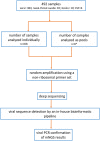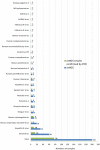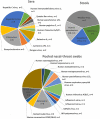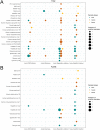Viruses in Vietnamese Patients Presenting with Community-Acquired Sepsis of Unknown Cause
- PMID: 31217274
- PMCID: PMC6711913
- DOI: 10.1128/JCM.00386-19
Viruses in Vietnamese Patients Presenting with Community-Acquired Sepsis of Unknown Cause
Abstract
Community-acquired (CA) sepsis is a major public health problem worldwide, yet the etiology remains unknown for >50% of the patients. Here we applied metagenomic next-generation sequencing (mNGS) to characterize the human virome in 492 clinical samples (384 sera, 92 pooled nasal and throat swabs, 10 stools, and 6 cerebrospinal fluid samples) from 386 patients (213 adults and 173 children) presenting with CA sepsis who were recruited from 6 hospitals across Vietnam between 2013 and 2015. Specific monoplex PCRs were used subsequently to confirm the presence of viral sequences detected by mNGS. We found sequences related to 47 viral species belonging to 21 families in 358 of 386 (93%) patients, including viruses known to cause human infections. After PCR confirmation, human viruses were found in 52 of 386 patients (13.4%); picornavirus (enteroviruses [n = 14], rhinovirus [n = 5], and parechovirus [n = 2]), hepatitis B virus (n = 10), cytomegalovirus (n = 9), Epstein-Barr virus (n = 5), and rotavirus A (n = 3) were the most common viruses detected. Recently discovered viruses were also found (gemycircularvirus [n = 5] and WU polyomavirus, Saffold virus, salivirus, cyclovirus-VN, and human pegivirus 2 [HPgV2] [n, 1 each]), adding to the growing literature about the geographic distribution of these novel viruses. Notably, sequences related to numerous viruses not previously reported in human tissues were also detected. To summarize, we identified 21 viral species known to be infectious to humans in 52 of 386 (13.4%) patients presenting with CA sepsis of unknown cause. The study, however, cannot directly impute sepsis causation to the viruses identified. The results highlight the fact that it remains a challenge to establish the causative agents in CA sepsis patients, especially in tropical settings such as Vietnam.
Keywords: Vietnam; community-acquired sepsis; viral metagenomics.
Copyright © 2019 Anh et al.
Figures






Similar articles
-
The Virome of Acute Respiratory Diseases in Individuals at Risk of Zoonotic Infections.Viruses. 2020 Aug 29;12(9):960. doi: 10.3390/v12090960. Viruses. 2020. PMID: 32872469 Free PMC article.
-
Gut Virome Analysis of Cameroonians Reveals High Diversity of Enteric Viruses, Including Potential Interspecies Transmitted Viruses.mSphere. 2019 Jan 23;4(1):e00585-18. doi: 10.1128/mSphere.00585-18. mSphere. 2019. PMID: 30674646 Free PMC article.
-
Impact of viral infections in children with community-acquired pneumonia: results of a study of 17 respiratory viruses.Influenza Other Respir Viruses. 2013 Jan;7(1):18-26. doi: 10.1111/j.1750-2659.2012.00340.x. Epub 2012 Feb 13. Influenza Other Respir Viruses. 2013. PMID: 22329841 Free PMC article.
-
Metagenomic characterization of viruses in the serum of children with newly diagnosed cancer.J Clin Virol. 2024 Dec;175:105736. doi: 10.1016/j.jcv.2024.105736. Epub 2024 Oct 6. J Clin Virol. 2024. PMID: 39405634
-
From orphan virus to pathogen: the path to the clinical lab.Curr Opin Virol. 2011 Oct;1(4):282-8. doi: 10.1016/j.coviro.2011.07.006. Curr Opin Virol. 2011. PMID: 22003378 Free PMC article. Review.
Cited by
-
Rhinovirus/enterovirus was the most common respiratory virus detected in adults with severe acute respiratory infections pre-COVID-19 in Kuala Lumpur, Malaysia.PLoS One. 2022 Sep 2;17(9):e0273697. doi: 10.1371/journal.pone.0273697. eCollection 2022. PLoS One. 2022. PMID: 36054088 Free PMC article.
-
SARS-CoV-2 and co-infections detection in nasopharyngeal throat swabs of COVID-19 patients by metagenomics.J Infect. 2020 Aug;81(2):e175-e177. doi: 10.1016/j.jinf.2020.06.033. Epub 2020 Jun 17. J Infect. 2020. PMID: 32562797 Free PMC article. No abstract available.
-
Redondoviridae: High Prevalence and Possibly Chronic Shedding in Human Respiratory Tract, But No Zoonotic Transmission.Viruses. 2021 Mar 24;13(4):533. doi: 10.3390/v13040533. Viruses. 2021. PMID: 33804837 Free PMC article.
-
Detection and Genetic Characteristics of Cosavirus and Salivirus in the Wastewater, China.Food Environ Virol. 2025 Aug 15;17(3):44. doi: 10.1007/s12560-025-09659-x. Food Environ Virol. 2025. PMID: 40815335
-
Beyond Cytomegalovirus and Epstein-Barr Virus: a Review of Viruses Composing the Blood Virome of Solid Organ Transplant and Hematopoietic Stem Cell Transplant Recipients.Clin Microbiol Rev. 2020 Aug 26;33(4):e00027-20. doi: 10.1128/CMR.00027-20. Print 2020 Sep 16. Clin Microbiol Rev. 2020. PMID: 32847820 Free PMC article. Review.
References
-
- Schultz MJ, Dunser MW, Dondorp AM, Adhikari NKJ, Iyer S, Kwizera A, Lubell Y, Papali A, Pisani L, Riviello BD, Angus DC, Azevedo LC, Baker T, Diaz JV, Festic E, Haniffa R, Jawa R, Jacob ST, Kissoon N, Lodha R, Martin-Loeches I, Lundeg G, Misango D, Mer M, Mohanty S, Murthy S, Musa N, Nakibuuka J, Serpa Neto A, Nguyen Thi Hoang M, Nguyen Thien B, Pattnaik R, Phua J, Preller J, Povoa P, Ranjit S, Talmor D, Thevanayagam J, Thwaites CL; Global Intensive Care Working Group of the European Society of Intensive Care Medicine. 2017. Current challenges in the management of sepsis in ICUs in resource-poor settings and suggestions for the future. Intensive Care Med 43:612–624. doi:10.1007/s00134-017-4750-z. - DOI - PubMed
Publication types
MeSH terms
Grants and funding
LinkOut - more resources
Full Text Sources
Medical

